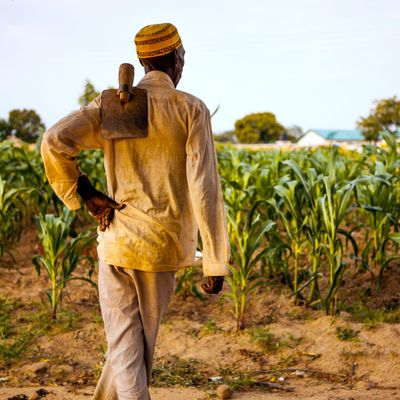
Farming is never easy, but beyond the long hours, uncertainty, and physical labor, farmers almost always feel like the smallest, least powerful point in the line from seed to consumer. In the U.S., that can come from monopolies of companies like Bayer-Monsanto and John Deere: You buy your seeds, fertilizers, and pesticides from one company, and sell to large blocs of purchasers who have all the power to decide pricing. In Ghana, the problem is access: access to reliable ways or the money to transport crops to market, access to finance to expand from typically small plots of land, access to buyers.
The lack of access has kept Ghanaian farms extremely small. According to Ghana’s Ministry of Food and Agriculture, the average farm size in the country is 0.4 hectares, or a little less than one acre. Just for comparison, the average farm size in the U.S. is over 175 hectares, literally hundreds of times larger. From the Ministry’s website: “The small farm size constitutes a remarkable barrier to agriculture and makes efficient production difficult, as it does not encourage the establishment and maintenance of economic layout.” The majority of Ghanaian farms are subsistence farms, to keep the farmers fed; any extra harvest is sold. But to whom?
“The lack of an access to a structured market results in smallholder farmers being forced to sell to middlemen who buy at ridiculously exploitative prices,” writes the team at AgroCenta, a mobile marketplace for Ghanaian farmers, on its website. Ghanaian farmers don’t have access to buyers in faraway cities, or access to truckers who can transport their goods to a central market. The middlemen provide a service, but it hardly benefits the farmers at all. The middlemen have all the power, and with a largely illiterate population of farmers, all the leverage.
AgroCenta, founded by two former employees of Esoko, a financial assistance app, is a sort of Swiss Army knife of tools to help address those issues. It’s not cutting out the middlemen, not yet, but it places some more power in the hands of farmers, with the goal of increasing that power. Within that knife are four platforms: AgroTrade, AgroPay, Truckr, and AgroInfo.
AgroTrade is a marketplace app, with buyers in the cities able to browse through all of the commodity farmers on the app. (The farmers are primarily growing staples, like rice, maize, soy, and millet.) Instantly, the small farmers have access to buyers.
Truckr aims to solve the transportation of goods problem; AgroCenta partnered with the Ghana Private Road Transport Union, a huge national organization of commercial drivers, to ensure that farmers can contact and book a driver quickly to get their goods to market.
AgroInfo is an educational news service, delivering crop price updates, weather advisories, that kind of thing.
And AgroPay creates a paper trail — albeit a digital one — of financial transactions for farmers, which they’ve never had before. Essentially it turns these sales into a sort of bank statement, a verified history of transactions which can be used to show banks or other lenders more about a farm. Previously, with sales to middlemen done free of records and in cash, it would be very difficult to show a bank that a farmer is a reliable producer; AgroPay creates a record.
AgroCenta isn’t exactly cutting out the middleman, because it sort of is the middleman, at least for now. Ghanaian farmers need some assistance to get this whole system set up, say the company’s founders. So AgroCenta has a team of agents who travel out to farms to help create an account and make trades. At the moment, they work on sales commission, which is theoretically better for farmers; it’s in the agent’s best interest to make the farmer as much money as possible.
But AgroCenta is also attempting to educate the farmers about how the whole process works, and through a combination of technologies — voice tech is a major help in this case — hope to transition to a more automated system where the farmers take care of all this themselves, at which point AgroCenta will make money through a subscription fee.
Ghana’s agricultural issues, like the agricultural issues in every country, are massive and systemic, and apps aren’t going to solve them all. But to put more power in the hands of those who had little, that’s a step in the right direction.